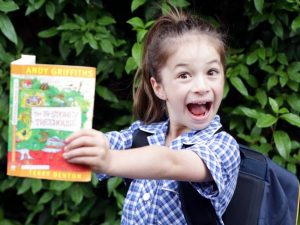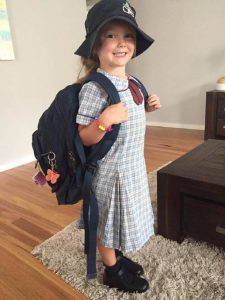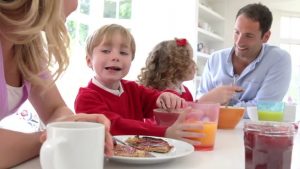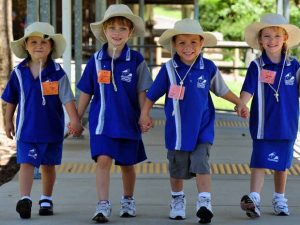 Familiar words to start a race.
Familiar words to start a race.
July 2017 has arrived and many little ones have started the beginning of a very exciting journey, not a race, but a milestone event leading down the track of learning. And after all the excitement of the first weeks has worn off. It can prove to be more challenging and less exciting for little ones. How can parents and family members make this time a positive experience? One that will set the field right to make school days the best days of your child’s life?
Imagine you have just turned five and the reality of ‘big’ school has just set it! It must seem like an enormous combination of excitement, fun, and perhaps deep down a bit of fear. Many children have been to kind and know about spending time with friends and having a great time in a less formal atmosphere. Now it’s time to learn the three R’s!
Reading…wRiting…and aRthmetic:
The basic building blocks of primary school education.
However, there is so much more to learning and if parents are able to provide the support needed on the home front then ‘ Ready, steady and go’ will be an easy ride for everyone.
Here are three R’s of suggested home support. They are guaranteed to make you, your child and your child’s teacher very pleased as ‘big school’ gets going.
Readiness…….Routine…….and Relationships.
The support scaffolding for a healthy start to big school.
R …… for …. Readiness:
School readiness was an important component of the last pre-school year. It is worthwhile going over a check list to see if there are any areas that could be cause for concern.
Here is a quick mini ten point check list for social and emotional readiness:
SOCIAL and EMOTIONAL READINESS
Is your child eager to be at ‘Big School’?
Can your child join in with a group activity and take turns in a game?
Can your child communicate with other adults and be willing to be helpful?
Will your child share toys, books and games?
Does your child play fantasy games, make-believe or imaginary games?
Can your child accept help from others when things go wrong?
Can your child accept responsibility?
Will your child try to focus on simple tasks and complete them?
Can your child express their feelings and needs?
Is your child able to go to the bathroom independently?
Your child’s kind would have made you aware of any areas that needed attention, but just look through the short list and reassure your child in any area that you may feel there could be an element of insecurity. Always be ready with positive praise and show approval when any of these aspects of development are evident.
Say things like:
“Well done you have shared your toys so nicely today.”
“Thank you for helping Mum carry the shopping, it was very kind of you.’
“That was a clever game you played with your dinosaurs today.’
Positive reinforcement and praise will make your child focus on the things he can do well.
Practice some skills that will help your child to be confident and independent.
Try these for example:
Opening and closing doors.
Using toilets independently, schools have separate boys and girls toilet facilities.
Getting dressed in the correct uniform, doing up buttons laces and putting on socks and shoes if the school uniform has all these components.
Changing into sports clothes.
Eating out of a lunchbox. Talk about a healthy lunch and see what the school recommends.
Raising your hand and waiting for your turn.
Remembering 2 -3 instructions – practise things like. Go to the kitchen, fetch a cup and bring it to me.
Play memory games and observation games.
Learn how to express your feelings. Read some stories that deal with feelings and say it’s ok to feel happy, sad, angry or disappointed.
 Have some fun and lighter moments with your kids.
Have some fun and lighter moments with your kids.
Remember the saying ‘all work and no play makes Jack a dull boy’.
Keep that in mind and prepare your child for some of the wonderful new and exciting things that will happen at big school.
Avoid negative conversations and the temptation to relive your school days if they were not the best days of your life. Education and schools have changed and are geared to bringing out the best in every child with positive re-enforcement.
Drive the route to school and point out landmarks or interesting things along the way so your child is familiar with the journey.
Have a pre-school photo shoot in the new uniform.
Pack your child’s school bag and practise walking with it pretending to go to school.
Make sure EVERYTHING is labelled and your child can read their own name.
Have a school colours treasure hunt just for the fun of finding crayons, naming their colours and returning them to their pencil case.
Organise a play date with someone who is in your child’s class.
Practice saying the teacher’s name especially if it is a difficult one.
This may seem like a daunting task but many of the activities have already been part of your child’s kindy routine and so this check point will help highlight anything that is amiss. Double checking on these things will help you, as a parent, to feel confident about your child’s readiness to go to school.
Now you are ready, get steady with a routine.
R….. for……. routine:
Recognise three important times of the day that can help make your routine secure and smooth for your child starting school. Having a plan is the key so aim to set aside:
an evening routine,
a morning routine and
afternoon routine.
 Why start with the evening…..Well, a good night’s sleep and evening routine ensures a better day. The body and mind are rejuvenated during the night. Explain this to your child so he/she will understand why you want bedtime to be earlier during school time.
Why start with the evening…..Well, a good night’s sleep and evening routine ensures a better day. The body and mind are rejuvenated during the night. Explain this to your child so he/she will understand why you want bedtime to be earlier during school time.
A healthy night’s sleep for a child is 9 to 10 hours, a minimum of 8 hours. Children who do not get enough sleep struggle to concentrate the next day.
Helpful tips for a good evening routine:
Try going to bed half an hour earlier for a few days before school starts.
Have a bedtime story or quiet down time to end the day. Some children like to have one on one chat time about their day before they go to sleep.
Get the school clothes ready before going to bed.
Check the calendar to see if there are any events to be prepared for the next day.
Plan breakfast the night before and any items that could be pre-packed for the school lunch box.
Check your child’s school bag for notices or special requests from the teacher.
This is especially important if you do not do your child’s homework in the afternoon.
Make a picture chart of what to do for the bedtime routine.
For example: Bath/get clothes ready for tomorrow/brush teeth/have story-time or chat time/go to sleep. Choose pictures from a magazine to make your chart.
Helpful tips for a good morning routine:
Wake up a bit earlier in the first week to get routine established.
Give your child an alarm clock so there is a personal response to getting up on time.
Have a morning get ready plan that your child knows
ie: get dressed, have breakfast, check your school bag, pack lunch and be ready to catch the bus or get in mum’s car.
Always have a healthy breakfast.
Pick up everything needed to take to school and check everything is there before going to the car or catching the school bus.
Talk about any different events ie: school outing or sports so your child knows you are supportive and pack any extra clothing or school requirements.
Say a positive goodbye and make sure your child knows what is happening for that day including lifts if you are not collecting.
Helpful tips for a good afternoon routine:
Have some rest or down time after school. Half an hour should be enough.
Encourage a healthy snack at this time.
Prioritise homework as it is still fresh in the child’s mind.
If mum is not the homework supervisor then save something to do with Mum when your child gets home. ie reading or discussion or spelling words.
Have an early supper together as an opportunity to discuss the day and plans for tomorrow. Make sure everyone gets a chance to say something.
Don’t be tempted to organise too many extra activities initially.
Talk about time so there is a sense of keeping track of the day or the need to get things done in a routine. For example: We have 10 mins to get ready and need to be organised. Keep a track of the time and praise your child for doing it on time.
Remember the value of planning and a routine….Education.com says…
“Routine – a sense of order, is not only important for making your child feel secure at this moment, but it will allow your child to internalise an automatic sense of how to organise his own life as he grows up.”
Schools are social enterprises where relationships matter. Your child is going to be facing new friends, new teachers and a whole new world where communication and interpersonal skills are important.
Albert Einstein wrote:
“Education is what remains after one has forgotten what one has learned at school.”2
This may seem a strange thing for such a well- known genius to say but if you put school into perspective it is the life lessons that really count a lot and being able to relate to other people, through positive relationships, is a very important skill.
Three important personalities your child needs to consider are:
Themselves, their friends, their teacher.
Themselves:
Children need to have a good sense of self-esteem. Building on self-worth is important on a daily basis then they feel comfortable with who they are. Praise from parents and praise from teachers contribute to this aspect of building positive relationships.
Their friends:
Encourage your children to be kind to others, to share and not tell tales. Arrange play-dates. Attend school functions and be positive about school events. Let your child work out minor problems themselves, always be positive about other children and friends.
Their teacher:
Support the teacher in front of your child, take issues or concerns up with the teacher, build up the teacher’s image and take every opportunity to attend parent/teacher workshops and interviews. Be supportive of any extra needs in the school – collections and outings and special events.
You are ready, set and good to go.
Make this a positive experience for the whole family. Remember the three Rs for home support. They will stand you in good stead for more than just the first day or first year! This is a milestone event, a journey of life lessons as your child grows in so many different directions.
Keep this quote in mind as you offer support and love on this journey:
“Teaching kids to count is fine, but teaching them what counts is best”
Bob Taylor Starting School quotes.3
To Know more about Changes Psychology you can visit : www.changespsychology.com.au/about-us/
References:
www.startingschoolquotes.com
and good to read for additional support….
www.parentingscience.com
www.kidspot.com.au
www.transitiontoschool.net

